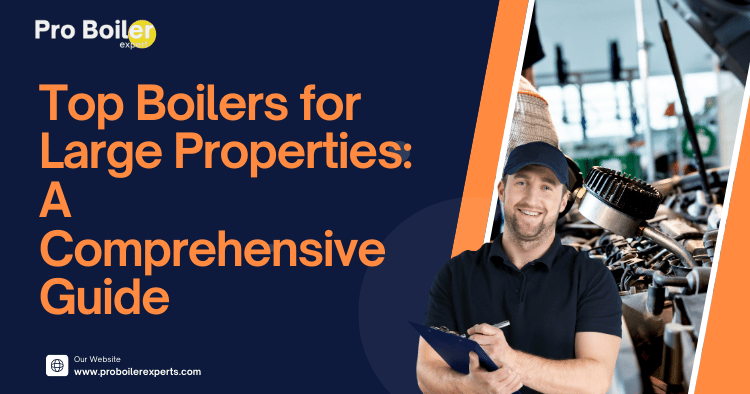Table of Contents
- Introduction
- Why Choose a Boiler for Large Properties?
- Types of Boilers Suitable for Large Properties
- Key Features to Consider
- Top Boiler Brands for Large Properties
- Installation and Maintenance Tips
- FAQs
- Conclusion
Introduction
When it comes to heating large properties, choosing the right boiler is crucial. A suitable boiler ensures efficiency, comfort, and reliability, especially in larger homes or commercial spaces. With various options available, it can be overwhelming to decide which one fits your needs best. This comprehensive guide will help you navigate the key considerations, types, and top brands of boilers for large properties.
Why Choose a Boiler for Large Properties?
Boilers provide central heating and hot water, making them an ideal choice for large properties. Unlike traditional heating systems, boilers distribute heat more evenly and can efficiently cater to multiple rooms. Here are a few reasons why boilers are well-suited for larger spaces:
- Efficiency: Modern boilers are designed to use fuel more efficiently, which can lead to significant cost savings over time. Many new models are rated highly for energy efficiency, making them environmentally friendly options.
- Space Saving: Many boilers can be compact, requiring less space than traditional heating systems, which is particularly beneficial in larger homes with limited utility space.
- Longevity: Boilers typically last longer than other heating systems, often exceeding 15 years with proper maintenance. This durability is a significant advantage for homeowners looking to minimize replacements.
*Did you know? Modern boilers can save homeowners hundreds of pounds in energy bills each year compared to older models.*
*Space is a premium in large properties—choosing the right boiler can free up valuable room for other uses.*
For more insights on heating systems, you can refer to the Energy Saving Trust.
Types of Boilers Suitable for Large Properties
When it comes to large properties, there are three primary types of boilers to consider:
Combi Boilers
Combi (combination) boilers are compact units that provide both heating and hot water on demand. They are ideal for smaller large properties with moderate hot water needs. However, their performance may diminish when multiple taps are used simultaneously.
Pros:
- Space-efficient
- No need for a hot water tank
- Quick hot water supply
Cons:
- Limited hot water supply during peak times
*Combi boilers are perfect for smaller families or homes with less simultaneous hot water demand.*
For more about the benefits of combi boilers, check out the article on Top 5 Benefits of Choosing Combi Boilers for Your Home.
System Boilers
System boilers are designed to store hot water in a cylinder while using a separate heating system. They are great for larger properties that require a lot of hot water.
Pros:
- Ideal for larger homes with high hot water demand
- Can supply multiple outlets simultaneously
- Integrated components make installation easier
Cons:
- Requires more space for the hot water cylinder
*If your home has multiple bathrooms or high hot water usage, a system boiler may be your best bet.*
Learn more about system boilers in our guide on Combination vs. System Boilers: Pros, Cons, and Key Differences.
Regular Boilers
Regular boilers (also known as traditional or conventional boilers) are best for homes with existing radiator systems and a high demand for hot water. They work with a cold water tank and a hot water cylinder.
Pros:
- Excellent for homes with multiple bathrooms
- Can supply large volumes of hot water
Cons:
- Requires more space and can be less efficient
*Regular boilers are often the go-to choice for older homes with established heating systems.*
Key Features to Consider
When selecting a boiler for a large property, consider the following features:
| Feature | Importance |
|---|---|
| Output Capacity | Ensure the boiler can meet the heating and hot water demands of your home. |
| Energy Efficiency | Look for high-efficiency ratings (A-rated or above) to save on energy bills. |
| Size and Space | Choose a boiler that fits your available space without compromising performance. |
| Control Options | Smart thermostats and zoning capabilities can enhance comfort and efficiency. |
| Warranty and Support | A good warranty can save you money on repairs; check the brand’s customer service ratings. |
*Selecting a boiler with the right features can significantly impact your comfort and energy costs.*
Top Boiler Brands for Large Properties
Choosing a reputable brand can make all the difference in performance and reliability. Here are some of the top boiler brands for large properties:
Worcester Bosch
Worcester Bosch is renowned for its high-quality and efficient boilers. Their product range includes combi, system, and regular boilers suitable for large properties.
Benefits:
- Industry-leading efficiency
- Excellent warranty options
- Trusted customer service
Learn more about Worcester Bosch.
Vaillant
Vaillant offers a wide range of boilers that combine efficiency with innovative technology. Their ecoTEC range is particularly popular among homeowners.
Benefits:
- Environmentally friendly options
- Smart technology integration
- Reliable performance
Ideal Boilers
Ideal Boilers specializes in a variety of heating solutions, including options specifically designed for larger homes. Their Logic+ System range is well-regarded for efficiency.
Benefits:
- High-efficiency ratings
- Compact designs
- Strong warranty and support
Installation and Maintenance Tips
Proper installation and regular maintenance are key to the longevity and efficiency of your boiler. Here’s what you need to keep in mind:
- Hire a Professional: Always have your boiler installed by a qualified engineer. This ensures safety and compliance with local regulations.
- Annual Servicing: Schedule an annual service to keep your boiler running efficiently. This will help catch any potential issues before they become costly repairs.
- Check Pressure Regularly: Keep an eye on the boiler pressure. Ideally, it should be between 1 and 1.5 bar.
- Bleed Radiators: If your radiators are cold at the top, it’s time to bleed them to release trapped air.
Professional installation isn’t just a suggestion; it’s a necessity for safe and effective operation.
Regular pressure checks can prevent bigger problems down the line.
For a comprehensive pre-installation checklist, refer to our article on Essential Pre-Installation Checklist for Your New Boiler.
FAQs
- How do I know what size boiler I need for my property?
The size of the boiler you need depends on the number of rooms, the number of bathrooms, and your hot water requirements. A heating engineer can perform a heat loss calculation to determine the exact size. - Are combi boilers suitable for large properties?
While combi boilers are compact and efficient, they may struggle to provide enough hot water for larger homes with multiple bathrooms. A system or regular boiler might be a better choice. - How long does a boiler last?
With proper maintenance, most boilers can last between 10 to 15 years. Regular servicing can extend their lifespan even further. - What is the average cost of a new boiler?
The cost can vary widely depending on the type of boiler, installation fees, and additional components needed. Generally, you can expect to pay between £2,000 and £4,000 for a quality boiler installation in a large property.
Conclusion
Choosing the right boiler for a large property requires careful consideration of your specific needs, the types available, and the brands that offer the best quality and support. By understanding the options and features available, you can select a boiler that not only meets your heating demands but also enhances the comfort and efficiency of your home. Remember, investing in a good quality boiler is an investment in your home’s future!
A well-chosen boiler not only keeps your home warm but also contributes to your overall comfort and energy efficiency.




